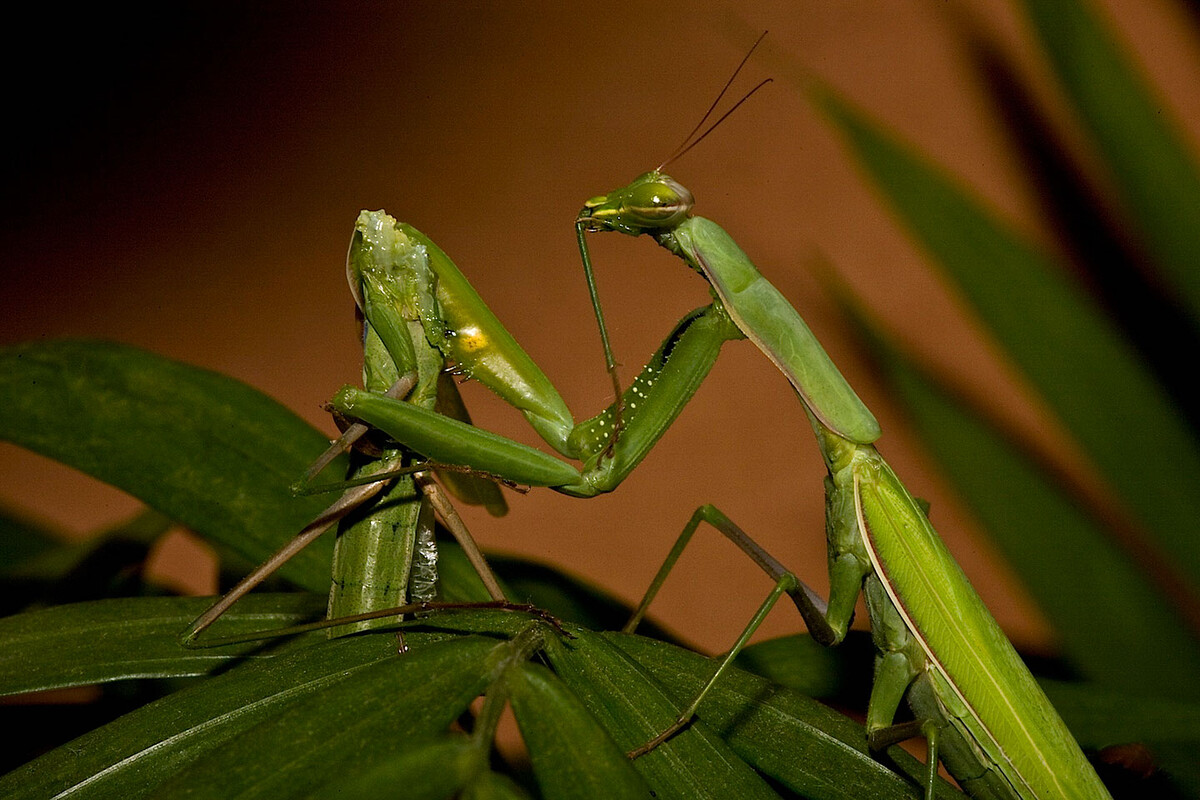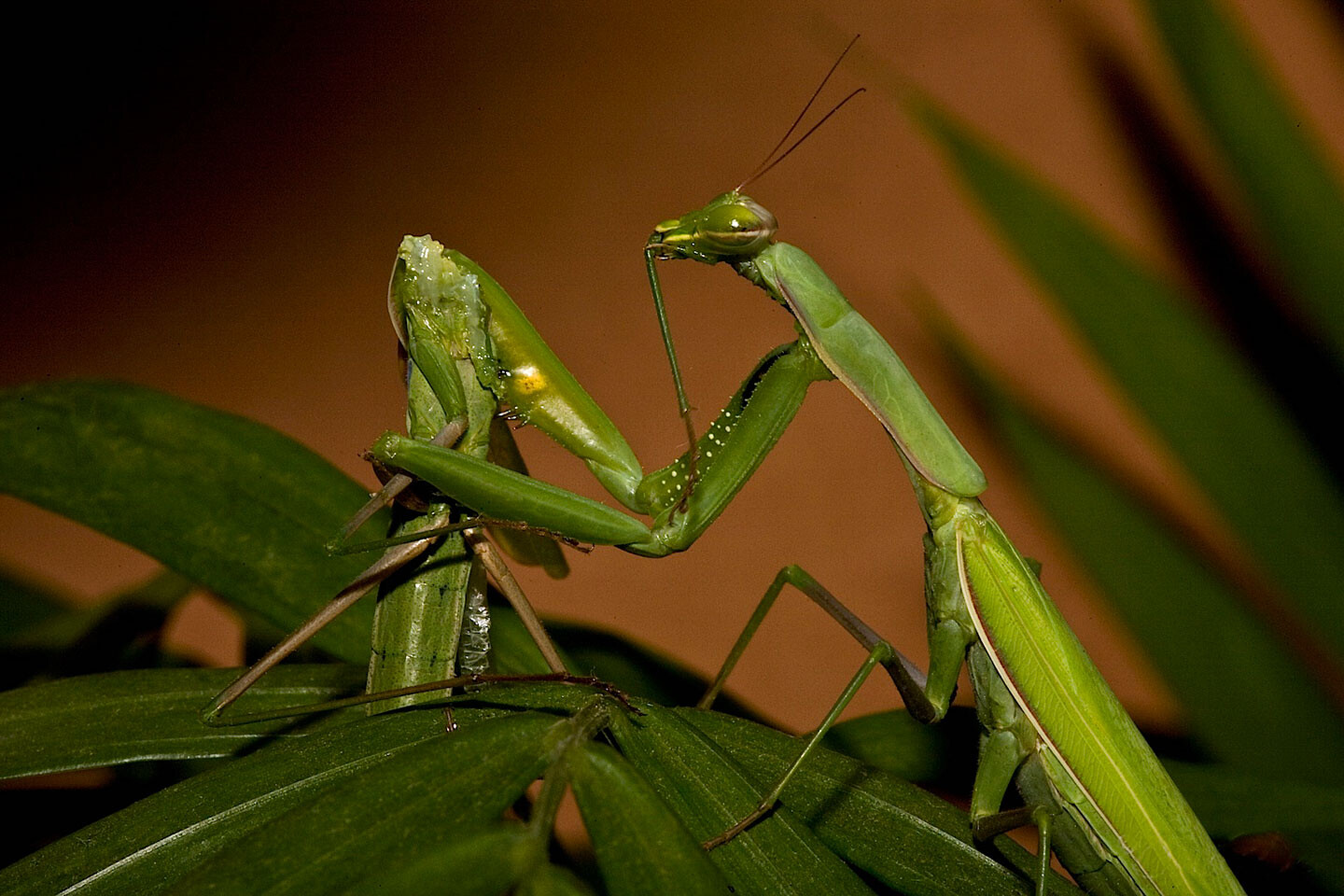Part 1: Before the Hereditary Home Test
Our most ancient animal ancestor, Dickinsonia costata, is categorically lodged between pestilence and creature.1 Or rather, Dickinsonia dithers in a space betwixt bacteria and animalia. Let us accept that our beginnings find us plunked down in the center of the margin.
She, a flat mat, possesses an expanding physical symmetry. Some bugs are fugitive like this; see how they slide under your domestic things. Yet her remains are found as fossils on remote Russian cliffs.2 Her gravesite overlooks a marginal sea, a part of the warming Arctic Ocean—a site of intense oil and gas speculation. The slightest psychedelic tendency urges me to bypass my oral and historic memory and uncover an otherworldly and cellular memory of Dickinsonia costata: “Mama!?” I lisp.
For months, I was often staring at Dickinsonia on a poster of early organisms that hung in our bathroom. A Guardian newspaper illustrator imagined Dickinsonia as a lapis-colored creature whose spanning fractals resembled a vulva in form. That toilet ponder: Is this Dickinsonia named after Emily Dickinson herself—The Flame-Haired Scribe?3
Back then, in a fecal haze—my gut microbiome deadened by antibiotics—fragments of Dickinson’s poems served as a support for my spurious claim: there must be a scientist asserting, as might Dickinson, that this rocky thing is a fossil metaphor for the “love marine.” Our paleontologist gets off on the ancient made literary and erotic, and thrills on this insistance of a geologic dyke lineage. Today, feeling more robust, I conjure auburn strands against navy fractals. Luscious Ancestor sans DNA?
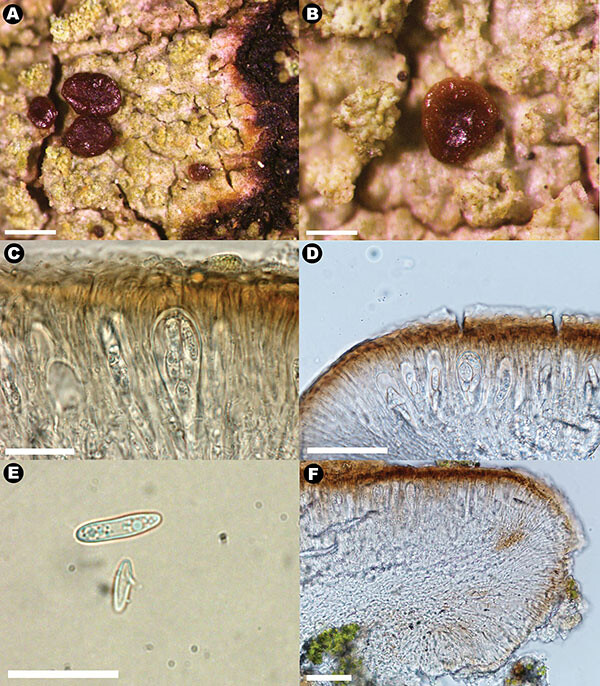

Image of the lichen Japewiella dollypartoniana, originally captioned “Morphology of Japewiella dollypartoniana. A–B, apothecia and thallus (0.5-mm scale bars). C–D, asci (C—20 μm, D—50 μm). E, ascospore (20 μm). F, details of excipular anatomy (50 μm).” Jessica L. Allen and James C. Lendemer, “Japewiella dollypartoniana, a New Widespread Lichen in the Appalachian Mountains of Eastern North America,” Castanea 80, no. 1 (March 2015): 59–65. See →.
The ruby-colored lichen Japewiella dollypartoniana was officially noticed … on Hangover Mountain, North Carolina.4 Pause at the geologic or gastric, a mountain re-named by settlers; the lichen is also named or re-named, this time by a woman scientist likening the lichen to country singer Dolly Parton (DP). Is the scientist winking at her working-class origins? Am I now? And just when is DP doing so?
And just how long do we get to claim ourselves working class and how long do we get to wink? What is the threshold for the legitimacy of this sort of claim?
Is it after one attends an elite New England boarding school (as did Carl Andre5—yet another who claims himself one of the “New England Working Class”) or is it later (when one shucks off a murder charge)? Is it when you have a pet and pet undergoes surgeries instead of the bullet back behind the treeline or, or, say the luxury of the animal spay … instead of hurling the weighted sack of kittens over the bridge into the flow or, or, or, is it once a person is lent a vacation home by people called colleagues or is it when one lends a second “home” to a “colleague”? Another sign: when one starts saying that you “can buy a building in that neighborhood for peanuts.” Where can I get these peanuts?6
I seek to isolate the moment when a gilded lumpen acknowledges that their sickle and hammer credentials are now powder. Me, a half-gilded lumpen, also seeks the recipe for reconstitution … to become a useful amalgamate not unlike particleboard.
My credential, my codpiece: my ma sang on road trips—the radio console was broken—through miles beveled by tunes. Dolly’s Jolene. By then she had eliminated the nasal Arkansas vis-à-vis San Joaquin Valley accent, but had not excised or bound her triple-D breasts. Now, in her sixties, she fantasizes about their surgical removal. I suggest their burial in miniature twin pine caskets. She likes that. But until my mother, or DP, has her breasts surgically removed, there is a doubling between these two—mother and crooner—and my mother can claim Dolly, as pretend relative, without shame; that is, if identification, as a twinning based on the physical and broke beginning, holds. For her, it does … she seeks out kinship in a body that holds the same distortions of class and gender and race. And more specifically, my mother needs a relative that understands how a female body, her own, has become a longstanding cultural joke (a wig, a bosom, a drawl). O alchemy of sound, please transform that joke into a commodity.
I send my mother a pair of earrings. I could have sent dangling resin replicas of Dickinsonia costata, crafted as an aside by Australian paleontologists.7 Instead, each earring I send is a miniature boob with a prominent pink nipple. She emails a photo of the glob hanging from the earlobe. I suggest that she point to her ears, additionally stacked with hearing aids, when old men stare at her old breasts. I return to and extend past Dolly Parton, body and voice—her treacle moan and treacle jingle, her tinny speaking voice. [What is it, Kinny?]
One lichenologist’s homage is followed by another: Hypotrachyan oprah.8 These composite organisms are beaded in human names and it makes humans who have temporarily elided their own identity with celebrities feel closer to an algae/cyanobacteria and fungus and yeast triad. The face of the superstar is superimposed over the very still life form and this naming is the cyanobacterias’ chance to be offered some sort of environmental protection. Hypotrachyan oprah and Japewiella dollypartoniana, surviving biota, require our aid in the Capitolocene. But the online images of Dolly Parton’s house for sale, her toilet installed next to the bed, are hard to hold next to the shrub that holds the lichen in mist.9 As temperatures soar, there are scientists who carefully remove some lichens, attaching them to rhododendrons, to scrub bushes further north. Instead of direct actions on weekends, we could instead move lichen—maybe Japewiella dollypartoniana … maybe the next working class celebrity lichen, Hypotrachyan oprah—toward the Canadian border.
But it’s too late for Dickinsonia costata, this Dickinsonia costata that has nothing to do with Emily Dickinson. She’s really dead forever.
This fossil’s slippage with Emily Dickinson was my own white fake-out.
Let’s ascribe it to a younger milk-skinned maiden’s fruitless and foolish search for the “good ancestor”—for a spiritual ancestor in the form of a nonreproductive elite. But ultimately, what most teenage class-traitors crave is to locate the emotional history of another class-traitor on scholarship … an intellectual ancestor, another raging changeling intoxicated by language.
Late-twentieth-century me, an anorectic interloper, was awarded a literary prize, The Collected Works of Emily Dickinson, a tome. Oh scholarship kid (the one who skips the line—the line of investment banker and tech spawn, the robber baron grandchildren), me the line-skipper who trudges across meadows and walkways that also once held a depressed teenage Edward Said,10 pubescent Pixley ka Isaka Seme,11 and a young and alienated June Jordan (but also the future founders of Friendly’s Ice Cream, Burger King, and Dogfish Head Brewery). My shoddy frame could neither incubate an elite and brilliant Emily Dickinson, Jr. nor orchestrate the ultimate backup: that is to fuck and secure a rich girl like Emily Dickinson—yes, even she seems the sort who limits her sensual love to rich girls. But I was unfit for that craft of licking up the wealthy … their sugar tits, copper boots, their golden ass, their heavy crap.12 Instead, I fell into long naps and longer masturbations to poems. I squandered my privilege and chance to wreck the world they offered me, and I would be no famous ancestor to anyone. Trash that I was and am, of course I would be too disorganized to effectively destroy their inheritance. Now my child, a geriatric birth at the end of the Anthropocene, asks me: “What does it mean to be tardy?”
The arbiters of the preparatory school’s prize day could have swiveled and swapped Emily Dickinson’s Collected Works for poet-alum June Jordan’s Things That I Do in the Dark: Selected Poems, 1954–1977. Maybe they were aware that Jordan was ambivalent about her scholarship to a hostile finishing school; more likely Jordan’s deft carving up of statecraft wasn’t embraced or incorporated in the late 1980s. Imagine if then and now, in the school chapel, fresh-faced rapists and victims were reading aloud: “all of it disclosed by the stars and the silence” …
… and the holy beauty of that line is the anesthesia. Then students holler the rest in unison:
I have been the problem everyone seeks to
eliminate by forced
penetration with or without the evidence of slime and/
but let this be unmistakable this poem
is not consent I do not consent
to my mother to my father to the teachers to
the F.B.I. to South Africa to Bedford-Stuy
to Park Avenue to American Airlines to the hardon
idlers on the corners to the sneaky creeps in
cars13,14
The inheritors could chant of gender violence and how it twines around the FBI and CIA’s agendas; these academies operated (and operate?) as feeder schools to not only the Ivy Leagues but also to the CIA,15 FBI,16 and the Supreme Court.17 I might hope these poets and this chanting change their pupils’ feckless allegiance with their DNA, their capital, and its henchmen. What do henchmen-in-training do with such poems—those who have decided they will be rewarded by the system if they play by the system? I remember that by then prep school rapes or heterosexual sex seemed to be without genetic issue. Unlike my mother, grandmother, and great-grandmother, no female pupil ever dropped out to have a baby—whether unintended, invited, or forced. They would not produce Government Men before their time. But now I think of microchimerism—that coital bogeyman—where residual genetic material from men passes into female bodies by way of a fetus, realized or not. Some autopsies have revealed Y chromosomes studding the female brain. “Frequently,” they wrote. “Widely distributed,” they wrote.18 Telegony? buzzes the fly.19
Some posit that the current US passion for ancestral DNA analyses is the individual’s desire to “connect to the greater globe,” but I remember my mother’s own exhaustive, mostly analog search for “the good ancestor” operating on very different terms. It was 1984. We lived in my grandparents’ house in Salt Lake City, Utah. My mother was waitressing double shifts at two restaurants; there was Johnny Quong’s Hawaiian, a themed restaurant that included timed earthquakes, rainstorms, and a falling palm tree; and there was a Lebanese restaurant, The Cedars.20 Her best friend in town was a fellow waitress called Mary, an Armenian woman who had run a brothel in Monrovia, Liberia. In her spare time, my mother hung out with Mary or sifted through the Salt Lake City geneological archives for related yeoman farmers—slaveless ones, she hoped, because she craved a moral kin.
One afternoon, we looked through an album of photographs of the Liberian club while sitting on her bed in Mary’s downtown SRO, one of a series of old brick hotels where drifters could book a single room for months at a time.21 I noted breasts, legs, shine, glitter, the fancy; I saw gawing johns. In the moment, in the sunlight, I liked how my mother’s friend Mary touched me, Mary. Was it like a Madame or a mother … or both? She lightly grazed my eleven-year-old face, repeatedly, with a soft hand. In her room, there wasn’t any sense that any of us—Mary or myself or my mother—had any roots. Nothing digging into any dark wet anywhere. No ancestors. No money. Pre-DNA test. We floated.
One night, after her Cedars shift, a man held a knife to my mother’s throat in the underground parking lot and ejaculated on her. She came home and washed her clothes. In my mind’s eye, we save her clothes and wait twenty-five years: I get to submit his DNA to DNA123 and trace his ancestors backward—to living cousins in Bethesda.
Will the genealogical research for perfect ancestors ultimately result in my mother swapping living child molestors (meaning brothers, uncles, fathers, grandfathers whose parental night shifts included sexual predation) for dead slave owners and viking rapists? Should we also disassociate from Ancestry.com? Literally and literarily, I could enter a state of white disassociation. It’s happening: the wind is soughing through the spinney. Do you notice palid gnomes punting in their frogskin coracle? Do you absentmindedly pluck the Y chromosomes from your skull?
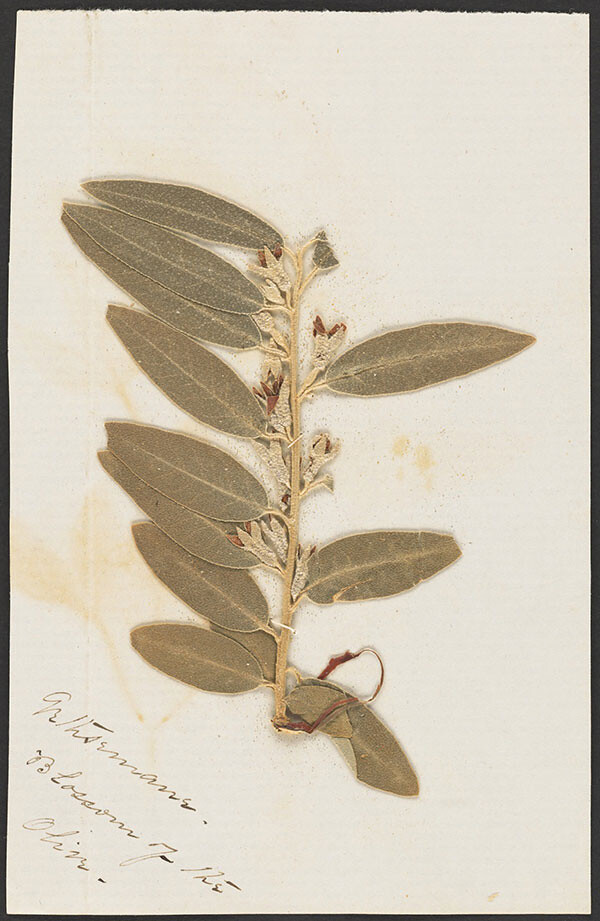

Emily Dickinson, Botanical Specimens: [Palestine] Gethsemane. Blossom of the Olive. (seq. 18), undated, Harvard University, Houghton Library (Access number: bMSAm1118_13-METS). The garden of Gethsemane was located on the historic outskirts of Al-Quds aka Jerusalem. Today, a grove of ancient olive trees on the site serves as a spiritual destination for Muslims, Jews, and Christians. It is writ that Jesus Christ took refuge here after his betrayal but prior to his crucifixion. Emily Dickinson references Gethsemane in her writings; she interpolates: this sacred geography and its accordant agonies is situated within her own psyche. Edward Said, educated just north of the Emily Dickinson historic site, also intercalates Jerusalem, honeycombed between Cairo and Massachusetts.
Part 2: After the Hereditary Home Test
My mother submits her DNA to a company. Results reveal that she is 19 percent Scandinavian.
“It wasn’t in any of my genealogical research.” On the phone, she sounds flummoxed.
“Vikings raped our Irish and Scottish ancestors, Mom.”
“Right, right.” She concedes.
Revealed by swab, this particular strand of rapist ancestors.
But some rapist ancestors (mine, yours) rape without record.
I don’t know who every raped person or rapist in our genome is or who every raping ancestor has raped. I see them surfacing in others’ charts—rotting buoys. Ancestor-seekers unwittingly swim towards … the (genetic) markers of a wreck.
The software deepens its pharmacological profiles over time but the dream of the good ancestor recedes … or at least her simpler dream of the un-raped ancestor dwindles. My mother begins to cleave closer to the Neanderthals. Her tests reveal more Neanderthal DNA than the average user. I begin to break down her features in accordance with web-page claims: straighter hair than most; sneezes after eating chocolate? I am imagining a Neanderthal with flyaway hair eating a Mars bar, sneezing and never … ever … forcing anyone … to do anything. My Neanderthal is looking out over the strait of Gibraltar. He sees an azure opening and the chocolate is making him feel good and he thinks it is beautiful.
My mother’s ancestral Neanderthal conjuring differs; 60,000 years separate our genetic reenactments. Whereas my chocolate-eating Gibraltar Neanderthal is the last of the last Neanderthals, hers is the first of the last. A Neanderthal with an insatiable libido, mother’s avatar is the first Neanderthal to willfully fuck a Homo sapiens. I picture the union in a river valley: genitals drip DNA and immunities are swapped. There are claims that the Neanderthals’ demise can be traced to this moment, this “genetic flow” that improved Homo sapiens’s resistance to diseases but did little to improve Neanderthal wellness. These findings are sourced from the bones located in a mound by a spring in the Marj ibn Amir Valley. Some archeologists and the Israeli Antiquities Authority call this the Levant, but my mother, in this porny middle paleolithic reverie or in street conversation, would call it Palestine. Palestinians, as a group, are the human beings she chose to identify with despite no shared heritage. This slippage begins when she, age nineteen, is a young single mother of a two-year-old. It starts when she travels through Bekaa—Damascus—London—Massachusetts—New Hampshire, with an origin point of California. Bekaa is several hours north of the Neanderthal gravesite described in the main text. Despite tourist-guide mentions of extraterrestrial landing sites at ancient Bekaa temples, my mother ignores the aliens and astrology. She is relentlessly entangled with the human.22 While helping a friend deliver her husband’s gravestone to Damascus, she gets the closest she’s ever going to get to this Neanderthal site in 1974. They aren’t far apart if one could drive through war zones, across soils spliced with more recent human remains.
In April 2019, my child asks if one can be a gnome or a Borrower instead of a human. A Borrower is a finger-length humanoid who lives off of human excess. If we sequence my child’s genome will The Borrower emerge? I try to be encouraging: “Mee-maw just had her DNA analyzed. You have Neanderthal ancestors … some say they are the ones the humans killed off because they were not as violent as themselves. YOU get to be Neanderthal!” In June, my child casually returns to this notion of an inherited genetic core that organizes bodies, his and others: “I am half Borrower, half praying mantis.” There is a pause. He relents, “I am half-human.” One week, he is clear that his name is now Ivy and that he must have skin-to-skin time with the nasturtiums’ pellas. I say, “I don’t think plants like to be touched.” He touches them anyway, like a human, as humans are to do.
Time-drone (that is a time machine that is also a drone) a Neanderthal. Panning close: Neanderthal hands shake (arthritis is also ascribed to these beings). This one is harvesting pine nuts and moss. Her peach-shaped ass is sunburnt (the propensity to sunburn is also Neanderthal). Like we will be, she is extinct. But we—my grandmother, my brother, my sister—inherit her peach-shaped ass. It—the derriere—buoys in her wake. This family ass is ancient. How many more iterations will there be? Time-drone thirty years forward: the seas are dead and the peach-shaped asses have cleaved from the toxic bone.
Today my child is obsessed with animal scat and rejects a focus on the Homo neanderthalensis ass; her near-human droppings are too close to human for his comfort; he understands himself as a minuscule and crafty creature that is only begrudgingly Homo sapiens; his survival depends upon a scale where all beings are writ smaller … something antihuman? Something fettered to the local? An industrial medical intervention—one that tinkers with his hormones—could staunch his growth: he could still weigh in at the size of a Sylvani, a sort of hulking Italian wood gnome with a know-how in lil’ pharma—we call it herbalism.
My child claims that an insect life is also more worth having than a human life.
But he is only staring at their forms and not their behaviors.
So although he has been introduced to worm reproduction—with a dirty fingernail I indicate the clitellum—he does not yet know about the sex lives of praying mantis. If he must be a praying mantisoid, would he imagine himself as decapitating instead of being decapitated? Or does he crave that another bite his head off? Which one, when … and why?
The praying mantis traits he imagines himself as inheriting are those that will make him green and delicate and dancerly; but after this transmogrification, won’t human traits still bubble up? Will he be decapitated or decapitating when he’s down to seeds and stems—and which genes will he serve and which will serve him? I know myself there are genes I am subject to, but there are also the ones I seem to have given the slip. Where is my fat? Where is my smoke? Oh, but here is my anxiety, curled like a cat on my throat.
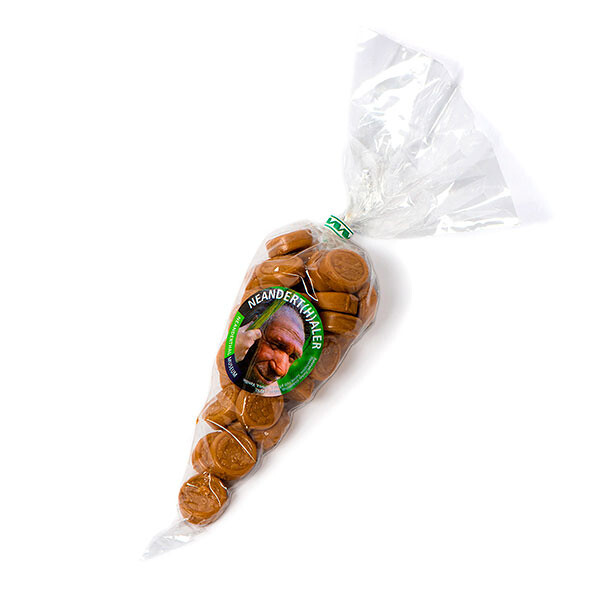

Neanderthal-themed caramel candies are available for purchase in the online shop of the German Neanderthal Museum. See ➝.
Part 3: A Final Blubbering Chanty
But in the US, whenever we begin to wax about what is human and near-human and extra-human, it is accompanied by a sort of Christian pop chorus about the fetus. Now I‘m in a chorus, too: but we singers deliver a blubbering chanty about dead women; and another chorus goes a third way that I wish I had realized … they go door-to-door, caroling about the supernatural.
They nearly yodel:
what about the giant’s aborted fetus …
the scale of a small whale?!!!!!!
And how about the gnome’s aborted fetus …
the size of a currant?
Roe Roe Roe
[Chanty over, carol over.]
A female gnome, braids tucked back, aborts in a bucolic setting, a sylvan clinic where she lies under the alder trees and sky. She isn’t interested in raising more yellow-bearded preppers; yellow-merkined preppers. There’s superficial evidence of this sort of gnome problem: an online photograph of a busty female ceramic gnome wielding an AK47. Gnomes are not miscreant. There isn’t a punk cell in their bodies and they have become unwitting participants in heteronormative white-supremacist survivalist fantasies. They scurry in the shadow of the settler giant, Paul Bunyan, and his Blue Ox, Babe (despite the Blue Ox’s brief reanimation as character-costume for a regional Minnesotan dyke wrestling match).
And so the chanty chanted that a renegade female gnome excised the male gnome spawn, or say deeper into the male gnome’s literary form, his partial woody helix.
The End
But ultimately, it feels errant for me to be so entangled in the reproductive in our hot and flooded gloaming hour; to have been focusing on locating, catching, and collecting a specimen (a sample of the gnome’s biological matter), in order to sequence the gnome’s genome … in order to have a gnome baby, a final halfling swim from my giant Bunyan womb—this in our last tilt before extinction. Spy my gnomish spawn riding a reconstituted, prehistoric cyprian dwarf elephant into a starvation sunset! This instinct is too Rabelaisian, my gushing response, literary and bodily, to what is imagined as a neo-medieval deprivation.
Something that slightly helps me imagine a human-like future is a humanoid featured in a British, mid-century children’s series penned by Mary Norton. The members of this particular fictional species are called “Borrowers.” Female Borrower Arrietty is the size of a finger, but with a rangier form than a human if the race-obsessed anthropologists were to scale us and them and compare. The American and British illustrators draw her white, but she’s just as likely to be brown as Cheddar Man—and like him, blue-eyed and lactose intolerant. It is only logical23 that a Borrower would be more genetically entangled with Ancient Brits than Sons of Eve and Daughters of Adam. In Borrowers Afield, Arrietty is premenstrual and living outside of personal reproduction. Lest one think that to live outside of reproduction is to be childish, pay close attention to this scene: she cavorts in the digitalis, a lethal plant.24 She pulls one blossom on her head as a cap and it sinks to her neck. To her consternation, she realizes it resembles an American Klansmen’s hood and this is not her aim. This humanoid knows she wants her relationship to inhumane humans to come to an end. She will never swab her inner lip—gagging on the swab—and airmail her cheek cells to Ancestry.com. There will be no connection.25 And a white American human cannot be-hood the self without beheading themselves—when they remove the hood, the head comes with it.
Freshly circumcised, I, an adult, surf the web. Blood leaks from the head, but that’s ok as every Western Emo knows there is carnage in being and every wannabe revolutionary admits there is human violence when a structure quakes, then breaks for good. Here are my wounded DuckDuckGo searches, before the interwebs cease up:
hot consensual circumcision
hot circumcision of consenting adults
hot white adults consenting to circumcision
Unresponsive page:
Caucasoid Homo Sapians Consenting to Circumcising their Power: Hot or Not? Real or Sot?
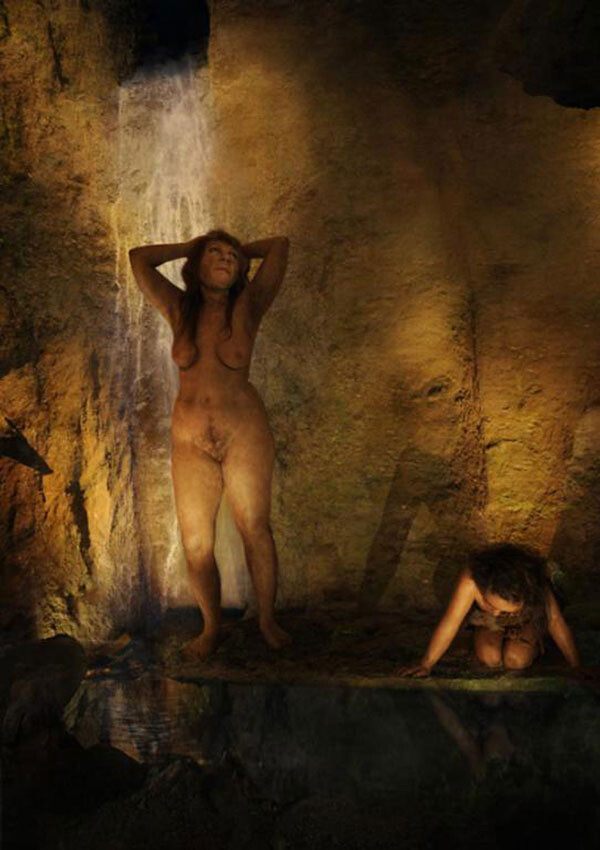

Poster available for purchase at the Kraneamus Krapina Neanderthal Museum in Croatia, which is part of the Museums of Hrvatsko Zagorje. See →.
Afterwords
I check in with an anthropologist at a local archeological institute. He’s spread crania all over the tables. I rub my fingers over the buckling, ridged part of one small skull. I don’t really care to touch other skulls that are smooth and familiar. But I touch this one because this thing was never running, breathing, weeping, shitting, singing; it’s part of a grouping cast from the real. These ones are made of plaster and other amalgamates. Still, can I violate the fake? Does the violence begin at replication? Think about hack simulations of body parts that process air … not the whoopee cushion that was never cast from anyone’s anus nor the consumer market anal tracts cast from consenting porn stars’ bodies … but say the Vocal Tract Organ, “which enables 3-D printed vocal tracts to be sounded via the provision of an electronic larynx and played via joystick or keyboard?”26 Its inventor, a white Brit, pops the joystick and a replica of a high priest (at the Temple of Amon in Luxor, circa 1100 BCE): trachea, throat, mouth goes YAWP, or really ennnhhhh … 27 Humans seem to be adept at violating on a timeline that stretches both backwards and forwards. I drag the mouse across it.
The anthropologist is clear that as data on Neanderthal and Denisovan populations rapidly emerges, it becomes increasingly apparent that the differences between “them” and “us” were perhaps subtle enough that they were not perceptible to these beings themselves. Moreover, these revelations, often bundled in new DNA analysis, radically alter the visualizations of both early humans and Neanderthals. Natural history museums commission new depictions, swapping out the decommissioned mannequins. Imagine the worker tasked with destroying the prehistoric ones. Could the museum worker be blamed if she resells work trash on Etsy? Maybe: for each intact cave dummy riding shotgun in a lone woman traveler’s car, there are scores of buyers who will crack the dummy open, pour their DNA in its craw, and sog the near visual duplicate; the fake bodies of archaic humans provide a site of millennia-old reenactment, an alpha desire to muck affinity—that unexpected and natural liking for the delicate difference in another. In the town of Cheddar (Somerset, UK), the earlier bust of “Cheddar Man” was installed at what was once called the Cheddar Man and the Cannibals Museum, but is presently named the Museum of Prehistory. The earlier display featured a shaggy-dark-haired, pale-skinned head rotating on motorized wheel; the whirling thing resembled a far-out, stoned Doobie Brother sort. (Where is he now?) Recently, analysts drilled into the skull and with the extracted bone powder completed a forensic analysis that rendered a more complete visual profile: Cheddar Man had a dark-brown to black skin tone and blue to green eyes. The twin brothers of Kennis & Kennis, a studio that specializes in historic anatomical reconstructions, generated a Cheddar Man with a hot, queer haircut, saucy twinkle in his eye, and beautiful brown skin.28 He does not spin and he feels sober. He is not related to other cave inhabitants, white cannibals with drinking vessels made of skulls. “How real is he?” online white supremacists rage.29
Tom Booth, an archaeologist at the Natural History Museum who worked on the [Cheddar Man] project, said: “It really [my emphasis] shows up that these imaginary racial categories that we have are really very modern constructions, or very recent constructions, that really are not applicable to the past at all.”30
Fouke Monster (sometimes described as Big Foot’s Midwestern estuarine cousin) is a hairy giantess who is sometimes seen but isn’t necessarily here. According to a Fox News report, the Fouke Monster is between six and nine feet with dark or reddish-brown hair. According to an old weblog, she was once spotted by a soldier on night duty at the Fort Leavenworth Military Penitentiary. The nightwatch soldier who spotted the Fouke Monster is purportedly immediately relocated. If a monster report is filed, the filer is also monstrous.
The Fouke circles the prison that held turn-of-the-century labor organizers, and anarchists; the one that jailed twentieth-century Puerto Rican liberation activist Oscar López Rivera, and the one that temporarily penned up its military fuck-ups.31 In daylight, the night after the sighting, other soldiers find some unusual footprints—has someone/something escaped?—in the sandy shore of the river that flows through the compound. This is the river where, a hundred years prior, a depressed military doctor slinks off to go birding.32
Like a human, I think the remaining Fouke plaits that red hair (woodside); but she’s something not human. Like some Neanderthals, Fouke suffers from surfer’s ear, as she has been regularly scouring an exoplanet’s river bottom; but make no mistake, she’s not Neanderthal. She’s also been hanging out in deep-sea vents and in the surrounding trans-crustal mush, crystal-rich. The universe is flat and she’s taking advantage of that. No residual RNA clings to tracks or bedding. The institution cannot account for this ancient hologram in the zone.
Soundtrack*
33
34
35
36
37
Maria Zakrevskaya and Andrey Ivantsov, “Dickinsonia costata — the first evidence of neoteny in Ediacaran organisms,” Invertebrate Zoology 14 (May 2017): 92–98.
See →.
Online, a digital version of an archived lock of Dickinson’s hair can be found courtesy of the Emily Dickinson Museum and Amherst College Special Collections. Originally, the lock was enclosed in a letter to Emily Fowler. Perhaps you should skip it? An artifact that is too much a creamy, callow celebration of a rich white girlhood no matter how laced with illuminating depression and literarily generative sexual oppression.
Jessica L. Allen and James C. Lendemer, “Japewiella dollypartoniana, a New Widespread Lichen in the Appalachian Mountains of Eastern North America,” Castanea 80, no. 1 (March 2015): 59–65 →.
See →. Of note: how Carl Andre’s preparatory-school activities organize his public identity amongst peers. As listed in the Phillips-Andover Academy Yearbook, Potpourri: Philo 3, 4; Winter Prom Committee 4; Varsity Debating 4; Film Society 4; Mother Liked the Trees; Rifle Club 3; All-Club Soccer 4; All-Club Baseball 3, 4.
But is this shucking off of class really just in adapting the casual phraseology of the well-to-do? … Nahh. It claims all affect—the many dimensions of breathing as articulated by a laugh, a scream, or say, the speed of speaking. It happens, this transmogrification of our class if and when, you or me, has ceased laughing heartily at our trauma; it is if/when you and me desist in our delivery of long-form stories or shouting a good joke from the rolled-down window of a moving car or … We stop interrupting and being interrupted by our own, talking over one another. But in a way that was also a pleasure, the pleasure of layering.
See →.
James C. Lendemer and Jessica L. Allen, “Hypotrachyna oprah (Parmeliaceae, Lichenized Ascomycota), a new foliose lichen with lichexanthone from southeastern North America,” Castanea 84, no. 1 (May 28, 2019): 24–32 →.
Scroll down to see photo of DP’s bedroom: →.
See Said’s 1999 memoir Out of Place for an explicit critique of both the landscape (white snowdrifts) and institution.
“In 1906 whilst in Columbia University, Pixley ka Isaka Seme, a … law graduate student from Inanda South Africa, delivered his speech ‘The Regeneration of Africa.’ In this speech he dreamt of the revival or renaissance of Africa. Richard Rive and Tim Couzens have noted, ‘it was largely through his ideas and inspiration that the African National Congress (Africa’s oldest liberation movement and South Africa’s ruling party) was founded’ (Couzens & Rive 1993:1). … Seme’s speech was quoted in its entirety by Kwameh Nkrumah in his speeches when he called for the regeneration of Africa’ (Nkrumah 1973:212).” R. Simangaliso Kumalo, “Ex Africa semper aliquid Novi!: Pixley ka Isaka Seme, the African Renaissance and the Empire in Contemporary South Africa,” Alternation, no. 14 (2015): 190–211; 191, 194.
One’s confidence in self-annihilation can obscure capitalism’s phantasmagoria … but moreover, my prep school did not see that the inheritance of the certain sort of whiteness they were offering me, if I behaved, had been made spumy, spoiled by all that surges in its wake. I did not understand that either. The subtext of the prize is that if a lumpenish kid like I was worked hard and was lucky, instead of a jailbird, a hooker, a radical, I could be a professor who publishes critical essays about Emily Dickinson.
From June Jordan’s “Poem About My Rights,” in Directed By Desire: The Collected Poems of June Jordan (Copper Canyon Press, 2005).
A poem as writ, to insider and outsider. Most of the chorus cannot claim they embody the intersectional position in Jordan’s “I,” and yet Jordan was also a wobbly, young form possibly seated in one of the same wooden seats in Sage Chapel where I, too, sat, without attachment to the genealogies of the wealthy, without a clear sense of the “promise” (of safety, of medical care, of affirmation).
Some examples: Robert Mueller, George H. W. Bush
Another example: Christopher A. Wry.
And others: Brett Kavanaugh, Neil Gorsuch.
See →.
See →.
Johnny Quong’s Hawaiian was later turned into a Veterans of Foreign Wars hall.
“SRO” is the acronym for single-resident-occupancy. SROs are semi-temporary, low-income housing. In the twentieth century, many SROs operated in the remains of nineteenth-century hotels in downtown Seattle (the original skid row), Portland, and Salt Lake City. I remember stopping by a number of SROs in Seattle as a kid, searching for my grandfather.
Since her return forty-five years ago, my mother has boycotted Israeli-made products; in the mid-70s, in Brooklyn, she used to wear a red-and-white checked keffiyeh and whenever schools were bombed she wrote furious letters (in her old-fashioned looping penmanship) to the implicated governments. Her relationship is different than say Jean Genet’s (who visited Palestinian refugee camps in Jordan in 1970) or, of course, Edward Said, whose contextualizing and seminal text Orientalism was published in 1978. Her visit is not only in between these critical nodes but it without the intellectual structures that inform Said and Genet’s analysis nor the male elite privilege that marks say Michel Auder’s spoiled, sexist, orientalist video trolls through Northern Africa. I’ll hazard that Auder thought he was too stoned to be considered a colonist or that perhaps Genet thought he was too gay to be an orientalist but I will also admit that my mother, as poor and fierce and queer and brave as Genet, was nevertheless stoned and weird and colonizing in her own manner. What she perceives as love I perceive as fetishism. This year, she tattoos a replica of Picasso’s camel to her shoulder and I wince and she shrugs off my wince. What she perceives as mutual, I perceive as inequitable.
But what sort of fictive logics emerge when white-supremacist investments in racializing comes to the fore? Data is not being visualized; psychological crises are being made into form.
Mary Norton, Borrowers Afield (Houghton Mifflin Harcourt, 1955), 147.
In the last volume, The Borrowers Avenged, Arrietty is clearly a pubescent Borrower. Following a move to an ancient vicarage, she initially experiences a fright when encountering the buildings’ ghosts. She comes to realize she can simply walk through the massive, translucent volumes of a human ghost, a dead human endlessly re-performing his own traumas. She will be unscathed.
Me, I think the contraption looks like many sculptures made in 2013 … castings and clean, ready-made hardware with dense conceptual backstories →.
See →.
See →. Dig deep into the Kennis & Kennis website. It is hard to imagine that SNL has not. The images are informed by bones and DNA, sure, but also by the artists’ own subjectivity. What do we begin to understand about how Kennis & Kennis feel about national belonging; sexual attraction; familial drama; and masculine embodiments. Don’t these get tangled in a way that a comedian and/or an academic cannot resist tugging at?
See The Violence of a Civilization Without Secrets (Dir. Adam and Zach Khalil in collaboration with Jackson Polys) for a North American dimension to how white supremacists attempt to shape narratives around beings exhumed →.
See →.
The political prisoners included over forty IWW organizers, including African-American IWW organizer Ben Fletcher (central to the longshoreman’s strike in Philadelphia).
1919: An officer of the Medical Corps, in charge of the surgical clinics for the Hospital of the United States Disciplinary Barracks at Fort Leavenworth, makes a casual checklist of spring migration. The barracks are situated on acres of uplands and river bottoms. Birds also cling to the buildings themselves. Purple martins nesting on the outer prison walls. The officer’s checklist includes a note regarding the freedom of the purple martins against the stillness of the prisoners. Officer David C. Hilton’s bird checklists for the Wilson Bulletin produced scores of calls and songs (over 150). Using Cornell’s ornithology archives, I looked up each bird listed and wrote down the specific calls: chew tuck chip chaa whaa phew joree chwirk sip pink zweet choo wichety grunt hiss yink … Full disclosure: in 2017, I made a sculptural installation, based on the Leavenworth research, for the Ulrich Museum, Wichita, Kansas.
Embedded Track: Vocal Tract Organ playing a synthesized form of grave-looted Nesyamun’s speech after death, after disinterment, after surviving a WWII Nazi air raid on the Leeds Museum, after 3-D scanning, after going viral. A DJ makes a loop, mixing it with another forced mummy audio track, Ötzi the Iceman’s vowels. Is this an illegal rave?
Circa 1999. Soundtrack lists were attached to the print columns in Punk Planet. Simultaneously fascinated, alienated, disbelieving, I scanned their cool. To be influenced? To inherit? To pilfer? You scan this, too. We barter? Historic disinheritance makes a sunny sonic barter impossible.
Revision Track: While in the process of revising this essay I listen to much music but also to a June Jordan interview conducted by Julius Lester on Pacifica radio in 1968. After Lester laughingly relays a cartoon about a white man stealing a heart from a living black man’s body, he invites Jordan to read “Uhuru in the O.R.” and her voice, low-toned yet urgent, delivers: The only successful transplant, from the first five attempts, means that a black heart kept alive a white man who upheld apartheid. At that moment, washing dishes, I recall that sometimes I imagine that the 45th president’s body is packed with looted organs. Isn’t that one way to reign forever, to make his brand of white power endless?
Jordan’s audio rolls on: I like love anonymous / more than murder incorporated or / shall we say South Africa / I like the Valentine the heart the power / incorruptible but failing body / flowers of the world. Then, a second verse: From my death the white man / takes new breath he stands as / formerly he stood and he commands me / for his good
These years, boarding schools pay radical poets to speak—not as poets, but sorcerers, paid to purify, to sterilize the instrument. Maybe these poets utter forked runes … cursing a student replica Kavanaugh and a proto Christopher A. Wry and blessing the ones who will betray their secret societies. (Supposedly it is only at death that University of Virginia’s Seven Society reveals a member to the public—by leaving a wreath of black magnolias, typically arranged in the shape of the numeral seven. Perhaps these poets are anointing with words those who might wreck the Seven Society after expertly sliding in. No black magnolia 7 for their grave.)
